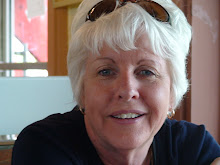 This is a picture of my father, John Byron Thompson, at about 3 years of age. He was born December 5, 1901 in Ephraim, Utah to John Oscar and Fannie Charlotte Green Thompson. He was the second child and first son of John and Fannie. There were six children in the family: Leda Faye, born January 5, 1900, my father, Alta Deon, born August 20, 1904, Fannie Valere, born October 7, 1907, Henry Theron, born January 19, 1911, and Thomas Evan, born January 17, 1915. Fannie Valere died of a ruptured appendix when she was 11 years of age and the baby, Thomas Evan, died of pneumonia when he was about 14 months of age.
This is a picture of my father, John Byron Thompson, at about 3 years of age. He was born December 5, 1901 in Ephraim, Utah to John Oscar and Fannie Charlotte Green Thompson. He was the second child and first son of John and Fannie. There were six children in the family: Leda Faye, born January 5, 1900, my father, Alta Deon, born August 20, 1904, Fannie Valere, born October 7, 1907, Henry Theron, born January 19, 1911, and Thomas Evan, born January 17, 1915. Fannie Valere died of a ruptured appendix when she was 11 years of age and the baby, Thomas Evan, died of pneumonia when he was about 14 months of age.I quote the following from my dad's life story, "As always these deaths were a real sorrowful time for the family. As time passes it seems to take care of these sorrowful times. I know it was a real bad time for my parents. Being young, things like that heal more reapidly than with parents. However, it took a long time to get over Valere's death." My dad was about 16 or 17 when his sister Valere died, and when he wrote his life story in his 70's he still remembered those sad feelings that he had at that young age.
Some other interesting things taken from his life story:
In the early 1900's going to Sacrament Meeting was for the adults of the Church. My dad attended Sunday School every week and was baptized in the Manti Temple. When he was about 9 or 10 years old he had a perfect attendance for a whole year of attending Church and was awarded a pin for his tie, which he kept and wore for many years. He was ordained a deacon and one of his duties was collecting fast offerings, which at that time were done "in kind". He used a wagon to collect the offerings in the summer and his sled with a box on it to do the job during the winter. The fast offerings usually consisted of things like flour, bacon, butter, eggs, bottled fruit, pickles, etc. After collecting them, he took them to the tithing office, where they were then distributed to the needy.
From a very young age, dad had chores to do like feeding the chickens, collecting eggs, weeding, feeding the pigs. Another important job he had as a young boy was to fill the trough with water when his father came from the fields with the horses after a day's work on the farm. It was a big job for him to pump enough water for four thirsty horses. As he grew older he had work to do with his father in the fields.
It was a different time for people back then. Children had to help with all the chores because there was so much manual labor required just to complete what was needed for everyday living. I don't believe my dad and his siblings ever said "I'm bored, what can I do?" If they had, grandma would surely have something for them to do, and it might not be something they would really relish.
Grandma was very supportive of education for her children. My dad told me many times how she would sit with him every school night after his chores and go over all that he had learned in school that day to make sure he understood and was making good progress. He always gave her credit for teaching him as much as his schoolteacher did. He also remembered standing in line outside the school to march into the classroom and the teacher standing alongside with the proverbial "hickory stick" to swat them if they got "out of line". What a difference a hundred years makes! For good or for bad, hmmm, I wonder.
Growing up on a farm affected my dad for his entire life. He was always an early riser. Even when he was retired he was rarely in bed after 6:00 a.m. He always had a large vegetable garden and any summer morning could be found at "first light" either planting, weeding, watering or harvesting in his garden. He was a hard worker and a "go-getter". His favorite saying when he had some project to do was "It doesn't take me all day to do a half day's work." These were habits and things that he learned in his childhood that helped him througout his life. A hundred years ago when work was a way of life, all learned its value. Today, I believe it is much more challenging to teach our children to value work, but no less important. I suppose we just have to be more creative in finding ways to make it happen.

Linda, awesome tribute to a wonderful man. I really enjoyed reading this post about his early years.
ReplyDelete